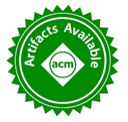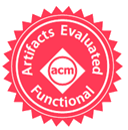Call for Demonstration Proposals
The Conference on Systems and Machine Learning (SysML) 2019 has a Demonstration Track running in parallel with some of the Poster Sessions, March 31st - April 2nd, 2019, in Stanford, California. The emphasis of the SysML demonstration program is on visionary, next generation systems requiring significant research and/or development effort. Proposals on prototypes that demonstrate new research ideas as well as open-source tools that have a high potential to facilitate research are highly encouraged.
Demonstrations offer a unique opportunity to showcase:
- Interactive applications of learning algorithms
- Efficient model training, inference, and serving
- Real-time visualization of learning models
- Hardware technology
- Testing, debudding, and monitoring of ML applications
- ML programming models and abstractions
- Programming languages for machine learning
- Systems which are relevant to the technical areas covered at SysML
Demonstrations must show novel technology and must be run live. Unlike poster presentations or slide shows, live action and interaction with the audience are critical elements.
Demonstration Proposal Deadline: February 10, 2019, 11:59pm PST
Submit demo proposals at the following URL: https://easychair.org/conferences/?conf=sysml2019demotrack
Submission instructions: Please use the same format as the main SysML Conference, sysml2019style.tar.gz. The demo track is single-blind and you do not need to anonymize the submission.
Notifications for the accepted proposals will be sent by March 1, 2019. Accepted proposals will NOT appear in the final proceedings (i.e., will not be archival) but will be posted on the SysML 2019 website as part of the conference program. The camera-ready deadline is March 15, 2019, at 12:00pm PST.
Selection of demonstrations for presentation at SysML is highly competitive. The evaluation criteria include both the audience experience and the novelty of the system. The proposal should describe in detail what SysML attendees who view the demonstration will experience. What exactly will the audience see? Will they be able to interact with the system? Is there an interesting scenario or script that the demonstration will use to motivate the demonstration?
Each demonstration proposal is submitted as a single PDF file and it must be no more than TWO pages in length. This page limit includes all parts of the proposal: title, abstract, body, and bibliography. The camera-ready of an accepted proposal must observe the same page limit. For the appropriate format follow the link provided above.
All submitted demonstration proposals should address the following points:
- the technology demonstrated
- the elements of novelty
- the live action part
- the interactive part
- the equipment brought by the demonstrator (if applicable)
- the special needs or equipment required at the place of the demo
Submissions will be refereed based on technical quality, novelty, live action, and potential for interaction.
Demonstration chairs: Theodoros Rekatsinas and Ce Zhang

